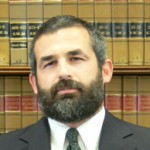Austin Ramsey
News Editor

Commonwealth Attorney Mark Blankenship may have a tough case ahead of him, according to an expert on cold cases at the University of Louisville.
Blankenship is the main prosecuting attorney in the re-indictment of Jerry Wayne Walker, who faces charges related to the 1998 Hester College fire, which killed one student and critically injured another.
Walker, a student when the fire occurred, was tried once before for murder and assault of the two students, but doubt on the part of a Calloway County Circuit Court jury led to a mistrial in 2001.
But in September of this year, 10 years after the initial charges were dropped, a special grand jury indicted Walker, 35, on a charge of second degree manslaughter, first degree arson, second degree assault and 14 counts of first degree wanton endangerment for the total residents on the west side of the fourth floor of Hester College where the fire was set.
Blankenship said after the arraignment hearing he was certain of his case. He suggested he would be employing additional evidence in the case set for a status hearing Monday.
“This thing is now back into the system and we’re going to move forward and we’re confident of a very different result this time,” he said.
Luke Milligan, assistant professor of law at the University of Louisville, said Blankenship will have to present a compelling case to bring such high-profile charges 13 years after the crime was committed.
Milligan said the prosecution will present a case at a sore disadvantage for two reasons: the fact that the charges stem from a cold case of more than a decade and because prosecutors are attempting a retrial of the same man.
He said additional disadvantages arise for the prosecution in evidence as well as jury and community interest. Often, Milligan said, prosecutors will find physical evidence either unusable or far less convincing due to degradation over time.
“Many of the instruments used to test physical evidence to determine the cause of the crime are dependent on a short time frame,” he said. “And so, nature does its work on the atoms and the cells that are being tested by these forensic devices.”
Cold case witness evidence too can be less convincing, he said.
“When time passes, a witness is less invested personally in a matter – less forthcoming, less willing,” he said. “It doesn’t sound like that’s the problem (in the case); it sounds like they’ve got new witnesses. But maybe some of those old witnesses won’t be as cogent.”
Milligan said prosecutors typically have a difficult time with any cold case in trying to convince jurors to care about the issue at hand. With an increase in time, he said, juries are less likely to even know much about the crime itself but more likely to know the defendant and his or her role in the community.
Since Walker’s mistrial, he was hired as an assistant principal in Paducah, Ky., although, Paducah Public School officials transferred him to the central office late last month, saying the case had become a distraction from his work. He is also married with three children, and serves as a part-time minister.
“We’re looking at a totally different person than we did 13 years ago,” Milligan said.
He said it is factors like those that turn the jury against the prosecution and toward the defense. He said the same effect is sometimes seen in the community, which will often begin to question the delayed response on the part of the prosecution.
“The community is reminded that justice has been delayed,” Milligan said. “It reminds people of a failure of an investigation that most people have forgotten about. In one sense it’s nice – ‘We’re finally bringing this person to justice’ – but very quickly there’s the other side of the coin that becomes apparent – ‘What took so long?’”
Milligan said, for that reason, he believes the prosecution would benefit from a change of venue.
Blankenship, however, said he plans on trying to keep the trial in Murray, but realizes it depends on preconceived feelings of the community.
He said he thinks the Monday status hearing in Marshall County will be the deciding ground for whether or not the judge permits a change of venue.
Contact Ramsey